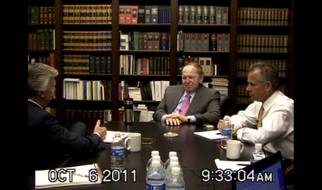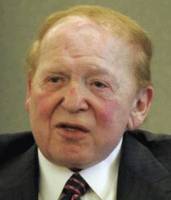Adelson Oct. Deposition

Viewing video requires the latest version of Adobe's Flash Player
Sheldon Adelson deposition, Oct. 6, 2011.
Archives
Adelson seeks contempt order over airing of deposition video (9-26-2011)
Commission tries to revive 1999 probe of Venetian hiring spree (9-26-2011)
Fired casino executive tries prying information from Las Vegas Sands, Sands China (9-23-2011)
Asian casinos boost Sheldon Adelson's ranking on Forbes list (9-21-2011)
A newly released video of a deposition of Las Vegas Sands Corp. Chairman and CEO Sheldon Adelson shows him politely and firmly refusing to answer some questions posed to him by a legal foe.
That’s in contrast to a previous deposition in another case in which Adelson’s legal foe, Las Vegas attorney Donald Campbell, said he was bossed around by Adelson and then intimidated when the billionaire casino mogul summoned an armed security officer to the event.
In the latest deposition, taken Oct. 6 in Las Vegas, Campbell is shown trying to gain background information from Adelson about two Adelson companies that handle his family’s personal affairs called Interface Operations LLC and AdFam LLC.
The October deposition was taken in Campbell’s office for a lawsuit in which a former personal driver for Adelson, Kwame Luangisa, claims he wasn’t paid overtime — charges denied by Adelson and his companies.
Campbell during the deposition appeared to be trying to gain information about Adelson’s involvement with and knowledge about one or more of the companies that employed the driver.
The deposition shows Adelson’s attorney, Patrick Hicks, repeatedly objecting to questions that Hicks charged had nothing to do with the driver’s overtime claim.
Adelson at times offered information to Campbell despite his attorney’s objections to the questions.
He even elaborated with some wit about the chefs employed by his family, saying, “I think my chefs would be insulted if you called them a cook.”
At other times during the deposition, Adelson agreed with his attorney that he shouldn’t answer the question posed.
“It’s irrelevant to the claim. What does it have to do with this overtime (case)?” Adelson said toward the end of the deposition in response to a question about any previous companies he owned also called Interface.
“I respectfully decline” to answer, Adelson said.
Hicks repeatedly challenged Campbell to explain the basis of his questions and at one point, Adelson chimed in.
“If you do explain we are willing to stipulate to certain things to save your valuable time,” Adelson said.
Campbell didn’t explain the basis of his questions.
“I appreciate that Mr. Adelson, but I have to represent my client in the manner in which I believe it protects and advances his interests — not yours, most respectfully” Campbell said.
In the end, Campbell halted the deposition after less than 10 minutes of questioning and the same day sought sanctions because of what Campbell calls obstructionist tactics by Hicks.
“Adelson and his counsel engaged in a continuing series of acts which were clearly designed to impede a fair examination of the deponent,” Campbell’s motion charged. “They did so by way of serial directives by Mr. Hicks that his client not answer the question on grounds of relevancy.”
Hicks fired back on Oct. 12 with his own motion for sanctions and a request that Adelson not be required to appear in any more depositions in the case.
“On the same day that he prematurely ended the deposition of Mr. Adelson, Mr. Campbell raced to the courthouse to file a pre-drafted motion and publicly disclosed the videotape of this deposition in direct violation of the parties’ signed stipulated protective order,” Hicks charged in his sanctions motion.
“Mr. Campbell’s termination of the deposition was clearly a pretext to manufacture a discovery dispute and appears to be part of a crusade to harass and embarrass Mr. Adelson. By publicly filing the videotape of the deposition he aborted...Mr. Campbell has within the period of 16 days violated two court orders regarding the public disclosure of deposition videos,” Hicks complained in his motion.
“This conduct is unprofessional and warrants this court’s intervention,” Hicks charged in his sanctions motion.
Robert C. Jones, chief U.S. District Court judge for Nevada, this week ordered that copies of the Oct. 6 deposition — which had been submitted as evidence — be provided to the news media after requests were made for the deposition by VEGAS INC, the Las Vegas Sun and the Las Vegas Review-Journal.
The earlier deposition publicly filed by Campbell and that Hicks complained about was from a case in 2006.
Campbell filed excerpts from the deposition to disprove allegations by Las Vegas Sands that he had tried to throw books at Adelson during the deposition.
U.S. Magistrate Judge Carl Hoffman has not yet ruled on whether Adelson will have to appear for another deposition in the pending driver’s lawsuit.
The driver’s overtime lawsuit was filed the same day in June that Campbell also filed suit against Las Vegas Sands on behalf of nine elite executive security officers for Adelson and his family. They, too, claimed they were not paid overtime.
That suit has now expanded to include claims some of the officers were subjected to racial discrimination — charges again denied by Las Vegas Sands.
